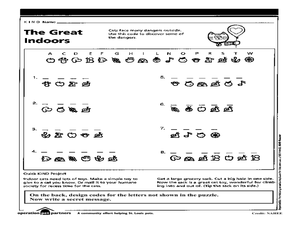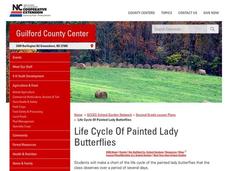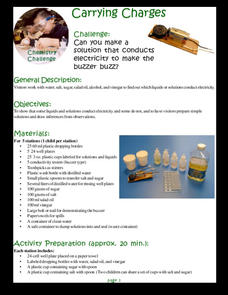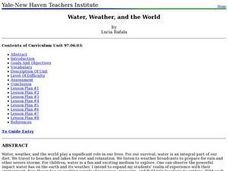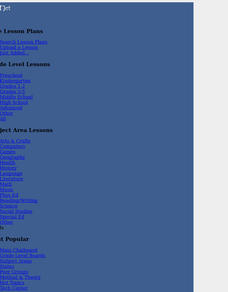Walt Disney Company
Disaster Preparedness Activity Book
Join the American Red Cross as well as Mickey and friends as they help to prepare young scholars for natural disasters. After reading brief informational passages about earthquakes, floods, fires, storms, tornadoes, and hurricanes,...
Curated OER
It can be a hazard!
Every child should know about the dangers of hazardous household materials. They draw a line between the types of material and the best precaution to stay safe when using that material. They can complete a secondary activity which has...
It's About Time
Accidents
Did you know that cars weren't designed for passenger safety until the 1960s? The lesson starts with a quick quiz on automobile safety. Then, scholars evaluate three cars for their safety features. This is the third in a set of nine...
Curated OER
Fabulous Felines: Keeping Cats Safe
Students discover ways to protect their pets. In this animal safety instructional activity, students role-play as pet "safety officers" and discuss how to make sure cats avoid dangers in the home. Students complete many pet...
NC Cooperative Extension, Guilford County Center
Life Cycle Of Painted Lady Butterflies
The Very Hungry Caterpillar is the inspiration for this project-based learning activity. Kindergartners create a lifecycle chart for a butterfly with four sections: egg, caterpillar, pupa, and butterfly. It is a three-dimensional...
Centers for Disease Control and Prevention
Learning about Giardia and Giardiasis - Research and Role Play
Young biologists begin researching giardia and completing an epidemiologic triangle. They then portray either a parent of a sick child or a physician in a fun role play activity.
Sciencenter
Carrying Charges
What's all the buzz about electricity? Scholars take part in a scientific activity to test the conductivity of liquids and solutions. They first see if water, salad oil, alcohol, and vinegar cause a buzzer to buzz when electrodes are...
Curated OER
Quality of life for kids
Young scholars explore the meaning of quality of life. Also, the need to prioritize means that government spending decisions are political, with winners and losers. Discussion platforms are on the six dimensions to a child's well-being:...
Curated OER
Water, Weather, and the World
Young scholars in a special education classroom examine the role of weather and water in their lives. Each day, they add a symbol for the weather outside and identify the proper activities for the weather on that day. In groups, they...
Curated OER
The Ocean: A Watery World
Pupils discuss the proper clothing for the season. They make wind chimes to use as an indicator of movement of the air and observe and identify the various cloud formations. They determine the basic rules of storm safety and discuss...
Curated OER
Adding Adaptations to Insects
Fourth graders investigate elements of physical adaptation in insects and organisms. They discover how adaptations can select an insect for survival and make an insect that be used in an outdoor discovery activity.
Curated OER
Toothpick Worms
Students investigate camouflage. For this science lesson plan, students experience the role of color in camouflage as they complete a hands-on activity.
Curated OER
Human Parts
Very young learners who are studying the human body will use this worksheet to identify certain body parts. A cartoon drawing of a boy is shown, and learners must draw lines matching up words such as arm, tummy, foot, and toes to the...
Curated OER
Can You Bag It?
Put your class's observational skills to the test with a science experiment about paper and plastic bags. After reading some background knowledge about the materials in plastic grocery bags, third graders interpret a chart to answer a...
Curated OER
Are Beds Made of Balsa Wood?
Here is an interesting resource which describes different kinds of wood and their uses. There is a table with six different types of furniture wood listed, and the number of worm holes found in each one. Based on the information in the...
Curated OER
Are These Made of Metal?
How can you tell if something is made of metal? Use a table of data and a science experiment to determine which items are made of metal. The experiment requires adult supervision, as it instructs third graders to build an electrical...
Curated OER
Easy Tie Die
Perfect for summer camp, an after school program, or your classroom, these instructions will make tie-dying a breeze! Simple instructions and helpful images make tie dying a fun and easy project. Tip: Have learners predict the outcome of...
Curated OER
Funny Ears
Young scientists get a worksheet that has a picture of a dog, a donkey, a person, a mouse, a rabbit, and a cat. Each picture has the wrong ears attached to it! Learners must draw lines matching up the ears with the correct recipient. The...
Curated OER
Plant Parts
Little ones identify the parts of a plant and practice following directions at the same time. They color each part of the flowering plant the color indicated on the sheet. Roots are brown, leaves are green, the flower is red, and the...
Curated OER
Snake Spiral
In this convection currents instructional activity, students draw, cut and decorate a spiral snake on a sheet of paper. Students attach a piece of thread to its head and hang it over a hot radiator and watch the snake spin as the warm...
Curated OER
Edible Soils
Students create soil profiles, including rock, clay, silt, sand, and humus, in clear plastic cups out of edible materials.
Curated OER
Animal Camouflage 1
Second graders work in groups and they are asked to line up on either side of the board. They are explained that on the teachers instruction, one student at a time runs to the marked area and brings back the first worm they see. Students...
Curated OER
All About the Human Life Cycle
In this life cycle worksheet, students read about the butterfly life cycle and draw pictures about it. Students draw 2 pictures and answer 2 short answer questions about the life cycle.
Curated OER
Acids & Bases: What's the Solution?
Students conduct an experiment called "What's the Solution? Acid, Base or Neutral." to determine the differences between these types of substance.



